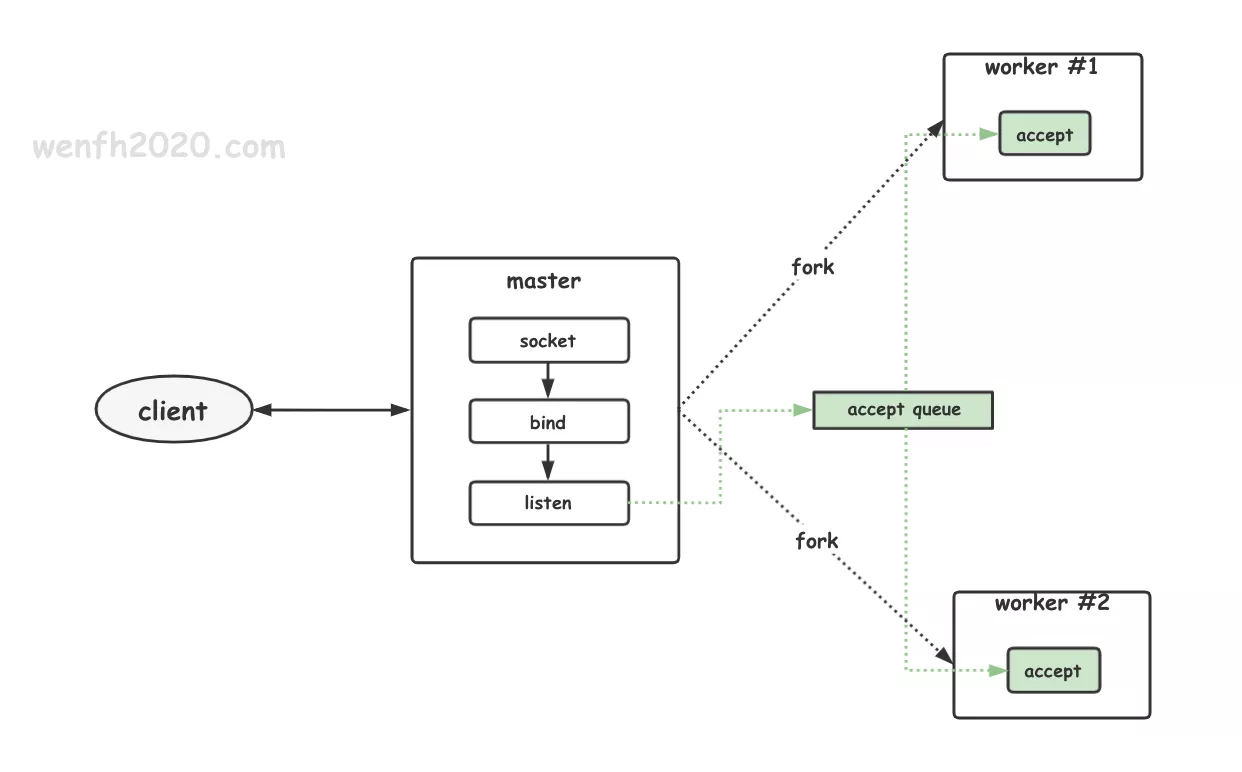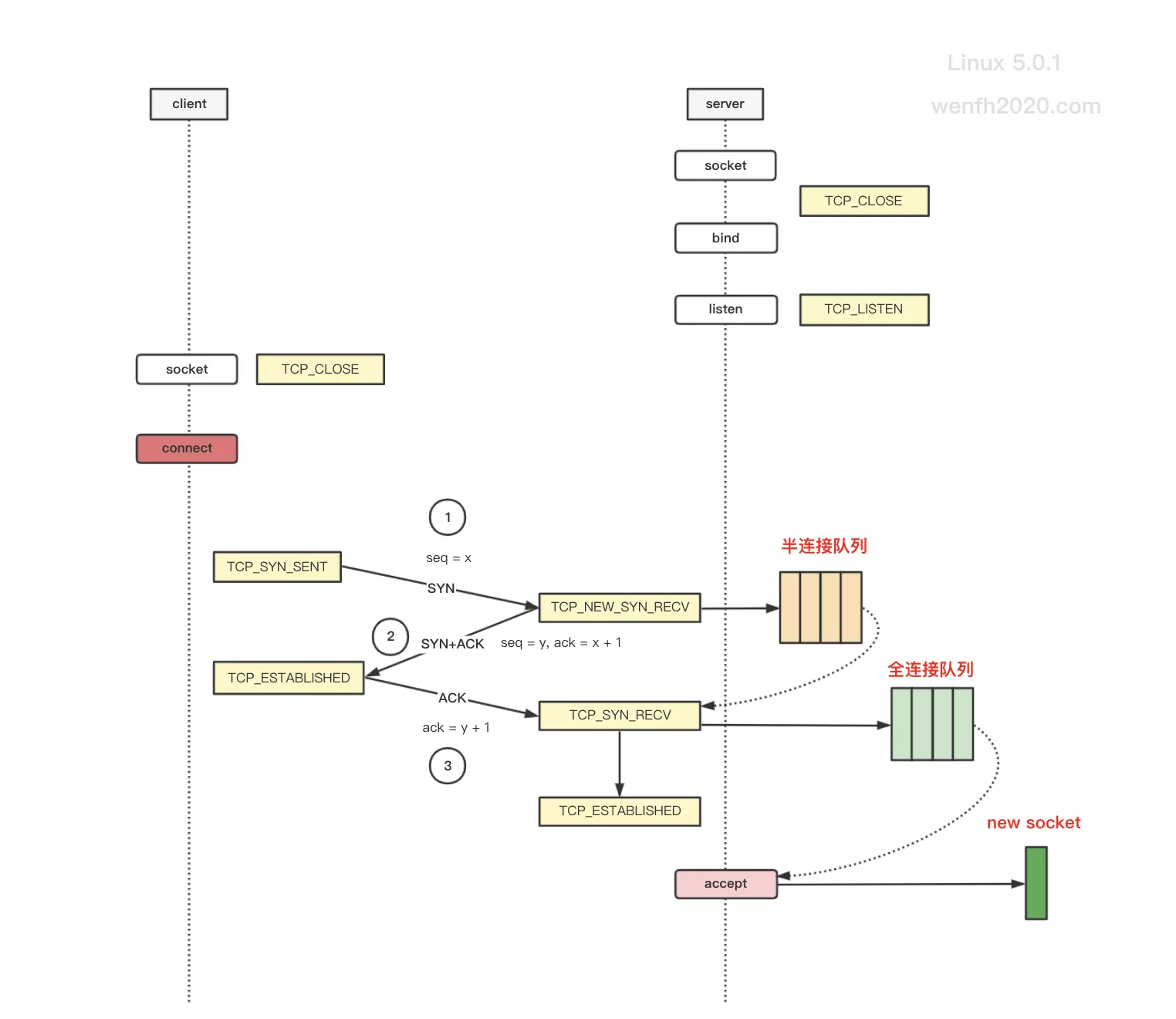早期的 accept 同步阻塞睡眠等待资源,当资源到来时,在多个进程或线程上睡眠的 accept 会同时被唤醒处理。后来 Linux 内核增加了 WQ_FLAG_EXCLUSIVE 排它唤醒属性,避免了惊群问题。
本文将深入 Linux 内核(5.0.1)源码,剖析在 TCP 多进程框架下,同步阻塞 accept 的惊群处理。
既然是 TCP 协议的 accept,那不得不了解三次握手和进程睡眠唤醒的原理。
- 探索惊群 ①
- 探索惊群 ② - accept(★)
- 探索惊群 ③ - nginx 惊群现象
- 探索惊群 ④ - nginx - accept_mutex
- 探索惊群 ⑤ - nginx - NGX_EXCLUSIVE_EVENT
- 探索惊群 ⑥ - nginx - reuseport
- 探索惊群 ⑦ - 文件描述符透传
1. 工作逻辑
正常的同步服务程序,会启动多个进程(worker #1 / worker #2)进行 accept 新的链接。
如下图,多个子进程共同 accept 主进程的共享 socket 的链接资源,当资源到来时,只唤醒其中一个进程处理,这样就避免了惊群问题。

- 子进程阻塞睡眠等待,添加排它唤醒标识(WQ_FLAG_EXCLUSIVE)的等待事件到等待队列。
1
2
3
4
5
6
7
8
9
10
11
12
13
14
/* kernel/sched/wait.c */
void prepare_to_wait_exclusive(struct wait_queue_head *wq_head,
struct wait_queue_entry *wq_entry, int state) {
unsigned long flags;
/* 添加排它唤醒标识 WQ_FLAG_EXCLUSIVE,也就是当资源到来时,内核只唤醒一个进程/线程。 */
wq_entry->flags |= WQ_FLAG_EXCLUSIVE;
spin_lock_irqsave(&wq_head->lock, flags);
if (list_empty(&wq_entry->entry))
__add_wait_queue_entry_tail(wq_head, wq_entry);
/* 设置进程的状态为 TASK_INTERRUPTIBLE,睡眠,但是可被中断唤醒。*/
set_current_state(state);
spin_unlock_irqrestore(&wq_head->lock, flags);
}
- 资源到来时,内核唤醒等待队列里的一个子进程。
1
2
3
4
5
6
7
8
9
10
11
12
13
14
15
16
17
18
19
20
21
22
23
24
25
26
static int __wake_up_common(struct wait_queue_head *wq_head, unsigned int mode,
int nr_exclusive, int wake_flags, void *key,
wait_queue_entry_t *bookmark) {
wait_queue_entry_t *curr, *next;
int cnt = 0;
...
/* 遍历唤醒等待队列。 */
list_for_each_entry_safe_from(curr, next, &wq_head->head, entry) {
int ret;
unsigned flags = curr->flags;
...
/* 将睡眠的进程唤醒。*/
ret = curr->func(curr, mode, wake_flags, key);
if (ret < 0) {
break;
}
/* 如果设置了 WQ_FLAG_EXCLUSIVE 标签的话,
* 执行一次唤醒(nr_exclusive == 1),就退出循环。 */
if (ret && (flags & WQ_FLAG_EXCLUSIVE) && !--nr_exclusive) {
break;
}
...
}
return nr_exclusive;
}
2. 三次握手
通过 TCP 服务端和客户端的链接流程,了解 accept 从 listener 的 全连接队列 获取新链接资源的工作流程。(参考下图TCP 三次握手流程。)

3. accept 内核源码
进程 accept 阻塞等待资源场景下,内核调用 inet_csk_wait_for_connect 等待资源。
通过源码了解它当资源到来时,怎么只唤醒一个进程处理的,关键在于 WQ_FLAG_EXCLUSIVE 排它性等待标识,当资源到来时,__wake_up_common 根据标识,只唤醒一个正在等待的进程。(参考 Linux 源码:5.0.1)
3.1. 睡眠等待资源
进程添加等待排它性唤醒标识 WQ_FLAG_EXCLUSIVE,prepare_to_wait_exclusive 将进程添加到等待队列,然后睡眠等待唤醒;
1
2
3
4
5
6
accept
|-- inet_accept
|-- inet_csk_accept
|-- inet_csk_wait_for_connect # 如果当前没有资源,进程/线程 睡眠等待资源,被唤醒。
|-- prepare_to_wait_exclusive # 将当前进程添加到等待队列。
|-- __add_wait_queue_entry_tail # 添加到等待队列。
1
2
3
4
5
6
7
8
9
10
11
12
13
14
15
16
17
18
19
20
21
22
23
24
25
26
27
28
29
30
31
32
33
34
35
36
37
38
39
40
41
42
43
44
45
46
47
48
49
50
51
52
53
54
55
56
57
58
59
60
61
62
63
64
65
66
67
68
69
70
71
72
73
74
75
76
77
78
79
80
81
82
83
84
85
86
87
88
89
90
91
92
93
/* net/ipv4/af_inet.c */
int inet_accept(struct socket *sock, struct socket *newsock, int flags,
bool kern) {
struct sock *sk1 = sock->sk;
int err = -EINVAL;
struct sock *sk2 = sk1->sk_prot->accept(sk1, flags, &err, kern);
...
}
/* net/ipv4/inet_connection_sock.c
* 从 listener socket 的全连接队列里取出一个新的已完成链接。*/
struct sock *inet_csk_accept(struct sock *sk, int flags, int *err, bool kern) {
struct inet_connection_sock *icsk = inet_csk(sk);
/* icsk_accept_queue 全连接队列。 */
struct request_sock_queue *queue = &icsk->icsk_accept_queue;
struct request_sock *req;
struct sock *newsk;
int error;
...
/* 如果 listen socket 的全连接队列是空的,进入超时等待状态。 */
if (reqsk_queue_empty(queue)) {
long timeo = sock_rcvtimeo(sk, flags & O_NONBLOCK);
/* 如果是非阻塞场景,返回 EAGAIN。 */
error = -EAGAIN;
if (!timeo)
goto out_err;
/* 阻塞场景下等超时等待链接资源。 */
error = inet_csk_wait_for_connect(sk, timeo);
if (error)
goto out_err;
}
/* 从 listen socket 全连接队列删除获取一个 request_sock 连接处理。 */
req = reqsk_queue_remove(queue, sk);
newsk = req->sk;
...
}
/* 请仔细观察源码的英文注释~~ */
static int inet_csk_wait_for_connect(struct sock *sk, long timeo) {
struct inet_connection_sock *icsk = inet_csk(sk);
DEFINE_WAIT(wait);
int err;
/*
* True wake-one mechanism for incoming connections: only
* one process gets woken up, not the 'whole herd'.
* Since we do not 'race & poll' for established sockets
* anymore, the common case will execute the loop only once.
*
* Subtle issue: "add_wait_queue_exclusive()" will be added
* after any current non-exclusive waiters, and we know that
* it will always _stay_ after any new non-exclusive waiters
* because all non-exclusive waiters are added at the
* beginning of the wait-queue. As such, it's ok to "drop"
* our exclusiveness temporarily when we get woken up without
* having to remove and re-insert us on the wait queue.
*/
for (;;) {
/* 将当前进程添加到等待唤醒队列,然后睡眠,
* 直到等待资源到来时候被唤醒或者满足其它条件被唤醒。 */
prepare_to_wait_exclusive(sk_sleep(sk), &wait,
TASK_INTERRUPTIBLE);
release_sock(sk);
if (reqsk_queue_empty(&icsk->icsk_accept_queue))
timeo = schedule_timeout(timeo);
sched_annotate_sleep();
lock_sock(sk);
err = 0;
if (!reqsk_queue_empty(&icsk->icsk_accept_queue))
break;
...
}
finish_wait(sk_sleep(sk), &wait);
return err;
}
/* kernel/sched/wait.c
* 添加等待唤醒队列,等待唤醒 */
void prepare_to_wait_exclusive(struct wait_queue_head *wq_head,
struct wait_queue_entry *wq_entry, int state) {
unsigned long flags;
/* 添加排它唤醒标识 WQ_FLAG_EXCLUSIVE,也就是当资源到来时,内核只唤醒一个进程/线程。 */
wq_entry->flags |= WQ_FLAG_EXCLUSIVE;
spin_lock_irqsave(&wq_head->lock, flags);
if (list_empty(&wq_entry->entry))
__add_wait_queue_entry_tail(wq_head, wq_entry);
/* 设置进程的状态为 TASK_INTERRUPTIBLE,睡眠,但是可被中断唤醒。*/
set_current_state(state);
spin_unlock_irqrestore(&wq_head->lock, flags);
}
3.2. 唤醒
资源到来,__wake_up_common 函数唤醒等待进程/线程。tcp 完全链接,是通过客户端与服务端进行 三次握手 完成的,所以当三次握手成功时,内核会将链接添加到 listener 的完全连接队列,看看最后一次握手,服务端唤醒 listener 的等待队列中的等待的 进程/线程。
1
2
3
4
5
6
7
tcp_v4_rcv
|-- tcp_child_process
|-- sk_data_ready # sock_def_wakeup
|-- wake_up_interruptible_all # __wake_up_sync_key((x), TASK_INTERRUPTIBLE, 1, poll_to_key(m))
|-- __wake_up_common_lock
|-- __wake_up_common
|-- autoremove_wake_function # 唤醒。
- 第三次握手成功时,__wake_up_common 函数调用堆栈。
1
2
3
4
5
6
7
8
9
10
11
12
13
14
15
16
17
18
19
20
__wake_up_common(struct wait_queue_head * wq_head, unsigned int mode, int nr_exclusive, int wake_flags, void * key, wait_queue_entry_t * bookmark) (/root/linux-5.0.1/kernel/sched/wait.c:92)
__wake_up_common_lock(struct wait_queue_head * wq_head, unsigned int mode, int nr_exclusive, int wake_flags, void * key) (/root/linux-5.0.1/kernel/sched/wait.c:121)
__wake_up_sync_key(struct wait_queue_head * wq_head, unsigned int mode, int nr_exclusive, void * key) (/root/linux-5.0.1/kernel/sched/wait.c:199)
sock_def_readable(struct sock * sk) (/root/linux-5.0.1/net/core/sock.c:2643)
tcp_child_process(struct sock * parent, struct sock * child, struct sk_buff * skb) (/root/linux-5.0.1/net/ipv4/tcp_minisocks.c:848)
tcp_v4_rcv(struct sk_buff * skb) (/root/linux-5.0.1/net/ipv4/tcp_ipv4.c:1875)
ip_protocol_deliver_rcu(struct net * net, struct sk_buff * skb, int protocol) (/root/linux-5.0.1/net/ipv4/ip_input.c:208)
ip_local_deliver_finish(struct net * net, struct sock * sk, struct sk_buff * skb) (/root/linux-5.0.1/net/ipv4/ip_input.c:234)
NF_HOOK() (/root/linux-5.0.1/include/linux/netfilter.h:289)
ip_local_deliver(struct sk_buff * skb) (/root/linux-5.0.1/net/ipv4/ip_input.c:255)
NF_HOOK() (/root/linux-5.0.1/include/linux/netfilter.h:289)
ip_rcv(struct sk_buff * skb, struct net_device * dev, struct packet_type * pt, struct net_device * orig_dev) (/root/linux-5.0.1/net/ipv4/ip_input.c:524)
__netif_receive_skb_one_core(struct sk_buff * skb, bool pfmemalloc) (/root/linux-5.0.1/net/core/dev.c:4973)
process_backlog(struct napi_struct * napi, int quota) (/root/linux-5.0.1/net/core/dev.c:5923)
napi_poll() (/root/linux-5.0.1/net/core/dev.c:6346)
net_rx_action(struct softirq_action * h) (/root/linux-5.0.1/net/core/dev.c:6412)
__do_softirq() (/root/linux-5.0.1/kernel/softirq.c:292)
run_ksoftirqd(unsigned int cpu) (/root/linux-5.0.1/kernel/softirq.c:654)
smpboot_thread_fn(void * data) (/root/linux-5.0.1/kernel/smpboot.c:164)
kthread(void * _create) (/root/linux-5.0.1/kernel/kthread.c:246)
- listen 的 socket 在创建时就注册了 sk_data_ready 唤醒函数。
1
2
3
4
5
6
7
8
9
10
11
12
13
14
15
16
17
18
19
20
21
/* include/net/sock.h */
struct sock {
...
void (*sk_data_ready)(struct sock *sk);
...
}
static int inet_create(struct net *net, struct socket *sock, int protocol, int kern) {
struct sock *sk;
...
sock_init_data(sock, sk);
...
}
/* net/core/sock.c */
void sock_init_data(struct socket *sock, struct sock *sk) {
sk_init_common(sk);
...
sk->sk_data_ready = sock_def_readable;
...
}
- tcp 第三次握手成功,
__wake_up_common唤醒进程/线程。
1
2
3
4
5
6
7
8
9
10
11
12
13
14
15
16
17
18
19
20
21
22
23
24
25
26
27
28
29
30
31
32
33
34
35
36
37
38
39
40
41
42
43
44
45
46
47
48
49
50
51
52
53
54
55
56
57
58
59
60
61
62
63
64
65
66
67
68
69
70
71
72
73
74
75
76
77
78
79
80
int tcp_v4_rcv(struct sk_buff *skb) {
process:
...
if (sk->sk_state == TCP_NEW_SYN_RECV) {
...
else if (tcp_child_process(sk, nsk, skb)) {
...
}
...
}
}
int tcp_child_process(struct sock *parent, struct sock *child,
struct sk_buff *skb) {
int ret = 0;
int state = child->sk_state;
...
tcp_segs_in(tcp_sk(child), skb);
if (!sock_owned_by_user(child)) {
ret = tcp_rcv_state_process(child, skb);
/* Wakeup parent, send SIGIO */
if (state == TCP_SYN_RECV && child->sk_state != state)
/* 唤醒 */
parent->sk_data_ready(parent);
}
...
}
/* sk_data_ready */
static void sock_def_wakeup(struct sock *sk) {
struct socket_wq *wq;
rcu_read_lock();
wq = rcu_dereference(sk->sk_wq);
if (skwq_has_sleeper(wq))
wake_up_interruptible_all(&wq->wait);
rcu_read_unlock();
}
/* 调用 __wake_up_sync_key 函数,将 nr_exclusive 唤醒进程/线程的个数设置为 1. */
#define wake_up_interruptible_sync_poll(x, m) \
__wake_up_sync_key((x), TASK_INTERRUPTIBLE, 1, poll_to_key(m))
void __wake_up_sync_key(struct wait_queue_head *wq_head, unsigned int mode,
int nr_exclusive, void *key) {
__wake_up_common_lock(wq_head, mode, nr_exclusive, wake_flags, key);
}
static void __wake_up_common_lock(struct wait_queue_head *wq_head, unsigned int mode,
int nr_exclusive, int wake_flags, void *key) {
...
nr_exclusive = __wake_up_common(wq_head, mode, nr_exclusive, wake_flags, key, &bookmark);
...
}
static int __wake_up_common(struct wait_queue_head *wq_head, unsigned int mode,
int nr_exclusive, int wake_flags, void *key,
wait_queue_entry_t *bookmark) {
wait_queue_entry_t *curr, *next;
int cnt = 0;
...
/* 遍历唤醒等待队列。 */
list_for_each_entry_safe_from(curr, next, &wq_head->head, entry) {
int ret;
unsigned flags = curr->flags;
...
/* 将睡眠的进程唤醒。
* curr->func ---> autoremove_wake_function */
ret = curr->func(curr, mode, wake_flags, key);
if (ret < 0)
break;
/* 如果设置了 WQ_FLAG_EXCLUSIVE 标签的话,
* 执行一次唤醒(nr_exclusive == 1),就退出循环。 */
if (ret && (flags & WQ_FLAG_EXCLUSIVE) && !--nr_exclusive)
break;
...
}
return nr_exclusive;
}
4. 测试
通过多进程架构进行测试(测试源码),主进程 listen,fork 两个子进程分别进行 accept。验证了阻塞的 accept 不会产生惊群问题。
Linux 线程与进程工作原理几乎一样,大家可以测测多线程。
1
2
3
4
5
6
7
8
9
10
11
12
13
14
# 主进程 listen,fork 两个子进程(child pid: 69312,69313)进行 accept。
[s][69311][2021-09-27 19:08:56.070][server.c][init_server:12] init server.....
[s][69311][2021-09-27 19:08:56.070][server.c][init_server:24] create listen socket, fd: 4.
[s][69311][2021-09-27 19:08:56.070][server.c][init_server:48] server start now, ip: 127.0.0.1, port: 5001.
[c][69311][2021-09-27 19:08:56.070][main.c][workers:79] child pid: 69312
[c][69311][2021-09-27 19:08:56.071][main.c][workers:79] child pid: 69313
[s][69312][2021-09-27 19:08:56.071][server.c][run_server:53] run server.....
[s][69313][2021-09-27 19:08:56.071][server.c][run_server:53] run server.....
# 新连接到来,只有一个进程(pid: 69312) accept 到资源。
[s][69312][2021-09-27 19:09:00.795][server.c][run_server:76] accept new client, pid: 69312, fd: 5, ip: 127.0.0.1, port: 40502
# 新连接到来,只有一个进程(pid: 69313) accept 到资源。
[s][69313][2021-09-27 19:09:02.266][server.c][run_server:76] accept new client, pid: 69313, fd: 5, ip: 127.0.0.1, port: 40504


